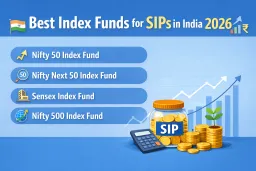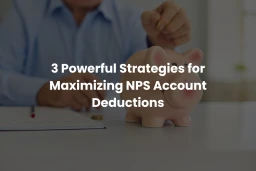Fixed Deposit vs Recurring Deposit : Which is the better option?
Fixed Deposit vs Recurring Deposit: Which is the better option" seeks to unravel the age-old dilemma in the realm of secure investments. In this comprehensive exploration, we delve into the nuances of Fixed Deposits (FDs) and Recurring Deposits (RDs), dissecting their respective merits and demerits. As stalwarts in the realm of risk-free investments, both promise assured returns over specific periods, yet their differences in earnings potential and suitability for various financial goals often spark debate. Join us on a journey to understand the intricacies, weigh the advantages, and discern the optimal choice between FDs and RDs, aiding you in making an informed decision tailored to your financial aspirations.

What is a Fixed Deposit?
A Fixed Deposit, also termed as a term deposit, stands as a financial investment product provided by banks and financial institutions. It operates akin to a savings account where investors can deposit a lump sum for a predetermined duration at a fixed interest rate.
Key attributes of Fixed Deposits include:
Fixed maturity periods varying from a few months to several years.
Fixed interest rates generally higher than those offered by regular savings accounts.
Flexibility in interest payouts, available periodically (monthly, quarterly, annually) or upon maturity.
Typically, interest earned on FDs is subject to taxation.
Renewal options for another term, with some banks offering automatic renewal unless specified otherwise by the investor.
Benefits of Fixed Deposit
Investing in a Fixed Deposit (FD) offers a range of advantages:
Encourages substantial savings over a fixed duration, fostering disciplined financial planning.
Tax-saving FDs under Section 80C allow for tax exemptions on investments.
Offers a secure investment avenue with assured returns through interest.
Flexible tenure spanning from seven days to ten years, catering to diverse investment objectives.
Yields higher interest rates compared to standard savings accounts, calculable via FD interest calculators.
Despite a fixed term, FDs provide liquidity, enabling withdrawals with applicable penalties, offering a balance between stability and accessibility.
What is a Recurring Deposit?
A Recurring Deposit (RD) serves as a savings account facilitated by banks and financial institutions, enabling individuals to systematically deposit a predetermined amount at regular intervals, typically on a monthly basis. RDs stand as a popular means of saving and accruing interest over a predefined timeframe.
Key features of RDs include:
Regular deposits of fixed amounts at scheduled intervals, often monthly, for a set duration.
Fixed tenure varying from a few months to several years.
Interest accrual on deposited sums, typically at a rate lower than that of Fixed Deposits (FDs).
Flexibility in choosing the tenure based on individual financial objectives.
Some RDs offer an auto-renewal feature, facilitating reinvestment of the matured amount into a new RD.
Benefits of Recurring Deposit
Investing in a Recurring Deposit (RD) scheme offers several advantages:
Flexible tenure spanning from six months to ten years, allowing investors to align the RD's duration with their financial goals.
Encourages regular savings and nurtures financial discipline by facilitating consistent investments.
Tax exemption under Section 80C for investments made in Post Office RDs.
Offers liquidity through the option of availing loans against RD investments.
Presents a risk-free avenue with a steady income flow via accrued interest.
Yields higher interest rates compared to typical bank savings accounts, calculable using a recurring deposit calculator to determine earned interest.

Fixed Deposit Vs. Recurring Deposit
Particulars | Fixed Deposit | Recurring Deposit |
1) Deposit Tenure | 7 days - 10 years | 6 months - 10 years |
2) Minimum Amount of Deposit for the Schemes | Rs. 100 | Rs. 10 |
3) Deposit Frequency of the Schemes | Single Deposit | Monthly deposit |
4) Interest Rates | 3% to 7% | 3.50% to 8.50% |
5) Payout of the Schemes | Fixed Deposits (FDs) offer flexibility with options for monthly, quarterly, or yearly withdrawals, ensuring a consistent income stream, making them a reliable income source. | Recurring Deposits (RDs) yield returns solely upon maturity, providing investors with a lump-sum payment at the end of the investment period. |
6) Withdrawals of the Scheme | This particular item is currently unavailable. However, depositors retain the choice to discount their investment and access their funds. Yet, such cases often receive less attention or consideration. | This particular item is currently unavailable. However, depositors retain the choice to discount their investment and access their funds. Yet, such cases often receive less attention or consideration. |
7) Auto-Renewal Facility of the Scheme | The facility is available to FDs. | It is not available to RD schemes. |
8) Default | Investors cannot default because the entire payment is made at the start of the term. | The bank or institution has the right to cancel the account if the depositors fail to make RD payments for six months in a row. |
9) Taxes on the Schemes | Interest income exceeding INR 40,000 incurs a 10% tax, whereas senior citizen depositors face taxation beyond INR 50,000. Submitting your PAN allows for the standard rate, while failure to do so results in a 20% reduction. | Interest income exceeding INR 40,000 incurs a 10% tax, whereas senior citizen depositors face taxation beyond INR 50,000. Submitting your PAN allows for the standard rate, while failure to do so results in a 20% reduction. |
10) Tax-Saving Facility | Deposits with a 5-year lock-in duration are available. | Not available to this scheme. |
11) Investment Type | FDs are one-time investment choices that do not encourage depositors to make ongoing investments. | RDs are monthly investment choices that require participants to invest every month for the length of the scheme. As a result, depositors will develop an investment habit. |
12) Insurance Over the Deposit | FDs have insurance coverage. | RDs have insurance coverage. |
FD vs RD, Which is Better?
For individuals without a lump sum but a consistent monthly income, a Recurring Deposit (RD) often fits better than a Fixed Deposit (FD). Both RDs and FDs cater to risk-averse investors in the lower tax brackets. Utilizing an online recurring deposit calculator can aid in deciding the optimal investment, aligning with available funds.
While no single investment may meet all needs, the affordability of an RD and its comparable returns to an FD often make it a favored choice for many investors.
Also read: Best Lifetime Credit Cards in India 2023
The Bottom Line
In conclusion, both Recurring Deposits (RDs) and Fixed Deposits (FDs) offer unique advantages, catering to different financial preferences and circumstances. RDs suit individuals with steady monthly incomes, allowing gradual savings without a lump sum. FDs, on the other hand, provide higher interest rates and flexibility in terms of tenure. The choice between RDs and FDs hinges on individual financial goals, risk tolerance, and available funds. Leveraging online tools like recurring deposit calculators aids in making an informed decision based on the investment amount and duration.
Ultimately, while RDs are more affordable and offer similar returns to FDs, each serves a distinct purpose in the realm of risk-averse, low-tax bracket investments. Investors should assess their needs and financial capabilities to determine the most suitable option between these two popular investment avenues.
Follow us on Instagram.









